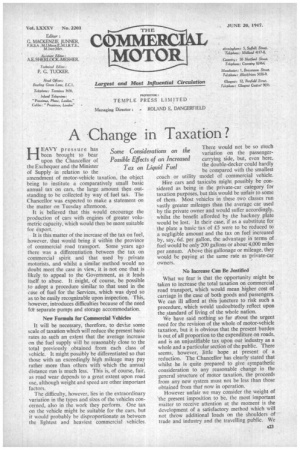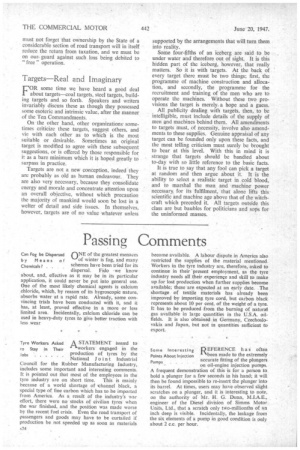A Change in Taxation?
Page 25

Page 26

If you've noticed an error in this article please click here to report it so we can fix it.
EAVY pressure has been brought to bear upon the Chancellor of the Exchequer and the Minister of Supply in relation to the amendment of motor-vehicle taxation. the object being to institute a comparatively small basic annual tax on cars, the large amount then outstanding to be collected by way of fuel tax. The Chancellor was expected to make a statement on the matter on Tuesday afternoon.
It is believed that this would encourage the production of cars with engines of greater volumetric capacity, which would then be more suitable for export.
It is this matter of the increase of the tax on fuel, however, that would bring it within the province of commercial road transport. Some years ago there was a differentiation between the tax on commercial spirit and that used by private motorists, and whilst a similar method would no doubt meet the case in view, it is not one that is likely to appeal to the Government, as it lends itself to abuse. It might, of course, be possible to adopt a procedure similar to that used in the case of fuel for the Services, which was dyed so as to be easily recognizable upon inspection. This, however, introduces difficulties because of the need fot separate pumps and storage accommodation.
New Formula for Commercial Vehicles It will be necessary, therefore, to dev:se some scale of taxation which will reduce the present basic rates to suet' an extent that the average increase on the fuel supply Will be reasonably close to the total previously obtained from each class of vehicle. It might possibly be differentiated so that those with an exceedingly high mileage may pay rather more than others with which the annual distance run is much less. This is, of course, fair, as road wear depends to a great extent upon road use, although weight and speed are other important factors.
The difficulty, however, lies in the extraordinary variation in the types and sizes of the vehicles concerned, also in the work they perform. One tax on the vehicle might be suitable for the cars, but it would probably be disproportionate as between the lightest and heaviest commercial vehicles. There would not be so much variation on the passengercarrying side, but, even here, the double-decker could hardly be compared with the smallest coach or utility model of commercial vehicle.
Hire cars and taxicabs might possibly be considered as being in the private-car category for taxation purposes, but this would be unfair to some of them. Most vehicles in these two classes run vastly greater mileages than the average car used by the private owner and would suffer accordingly, whilst the benefit afforded by the hackney plate would be lost. In their case, if as a substitute for the plate a basic tax of E5 were to be reduced to a negligible amount and the tax on fuel increased by, say, 6d. per gallon, the advantage in terms of fuel would be only 200 gallons or about 4,000 miles per annum. Above this gallonage or mileage, they would be paying at the same rate as private-car owners.
No Increase Can Be Justified What we fear is that the opportunity might be taken to increase the total taxation on commercial road transport, which would mean higher cost of carriage in the case of both goods and passengers. We can ill afford at this juncture to risk such a procedure, which would undoubtedly reflect upon the standard of living of the whole nation. We have said nothing so far about the urgent need for the revision of the whole of motor-vehicle taxation, but it is obvious that the present burden is out of all proportion to the expenditure on roads, and is an unjustifiable tax upon our industry as a whole and a particular section of the public. There seems, however, little hope at present of a reduction. The Chancellor has clearly stated that whilst he is quite prepared to give sympathetic consideration to any reasonable change in the general structure of motor taxation, the proceeds from any new system must not be less than those obtained from that now in operation.
However unfair we may consider the weight of 'the present imposition to be, the most important flatter to receive attention at the moment is the development of a satisfactory method which will not throw additional loads on the shoulders of trade and industry and the travelling public. We must not forget that ownership by the State of a considerable section of road transport will in itself reduce the return from taxation, and we must be on our, guard against such loss being debited to " free " operation.
Targets—Real and Imaginary
FOR some time we have heard a good deal about targets—coal targets, steel targets, building targets and so forth. Speakers and writers invariably discuss these as though they possessed some esoteric and intrinsic value, after the manner of the Ten Commandments.
On the other hand, other organizations' sometimes criticize these targets, suggest others, and vie with each other as to which is the most suitable or desirable. Sometimes an original target is modified to agree with these subsequent suggestions, or is offered by those responsible for it as a bare minimum which it is hoped greatly to surpass in practice.
Targets are not a new conception, indeed they are probably as old as human endeavour. They are also very necessary, because they consolidate energy and morale and concentrate attention upon an overall objective, without which precaution the majority of mankind would soon be lost in a welter of detail and side issues. In themselves, however, targets are of no value whatever unless supported by the arrangements that will turn them into reality.
Some four-fifths of an iceberg are said to be under water and therefore out of sight. It is this hidden part of the iceberg, however, that really matters. So it is with targets. At the back of every target there must be two things; first, the programme of machine construction and allocation, and secondly, the programme for the recruitment and training of the men who are to operate the machines. Without these two provisions the target is merely. a hope and a guess.
All publicity dealing with targets, then, to be intelligible, must include details of the supply of men and machines behind them. All amendments to targets must, of necessity, involve also amendments to these supplies. Genuine appraisal of any target can be founded only upon these facts, and the most telling criticism must surely be brought to bear at this level. With this in mind it is strange that targets should be bandied about to-day with so little reference to the basic facts.
It is true to say that any fool can pick a target at random and then argue about it. It is the ability to select a realistic target in cold blood, and to marshal the man and smachine power necessary for its fulfilment, that alone lifts this scientific and machine age above that of the witchcraft which preceded it. All targets outside this class are but baubles for politicians and sops for the uninformed masses.












































































